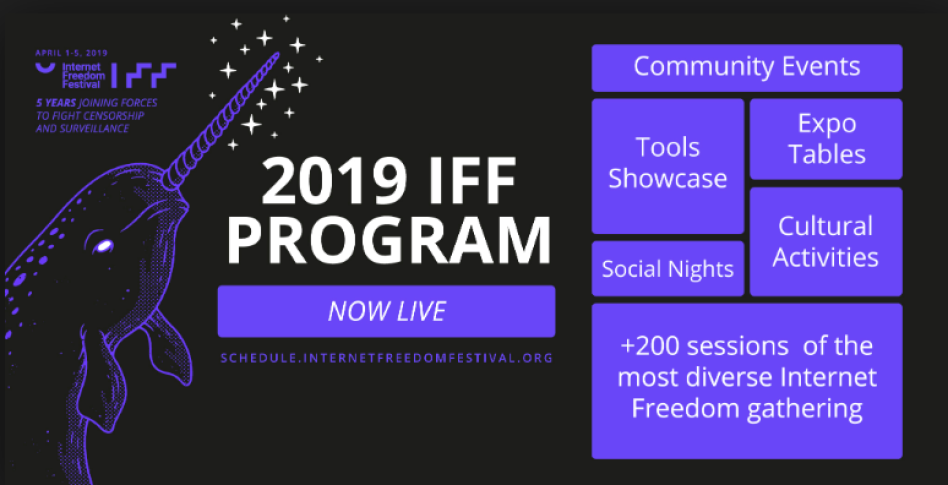
The Internet Freedom Festival (IFF) held in Valencia, Spain on a yearly basis has become one of the main events for civil society on internet rights with a special focus on surveillance, censorship and circumvention worldwide. The 2019 Internet Freedom Festival marks an important milestone, as it will be celebrating its fifth anniversary, with occasions for celebration and reflection.
The Festival can be followed remotely through the #InternetFF hashtag and by following @InternetFF. At APC, we'll be sharing live updates on @apc_news and @takebackthetech.
Sessions/highlights
Here is a list of sessions that APC staff and members are organising or leading:
-
Monday, 1 April, 2:45 p.m.: Mapping the Blueprint of Governmental Surveillance
The purpose of this session is to introduce and improve a blueprint of government surveillance, which will include the types of surveillance, the impact and scope of different kinds of surveillance, related (legal) cases in different countries, and how people could counter this surveillance.
-
Tuesday, 2 April, 9:45 a.m.: Implementing Tor in the global South, challenges and opportunities
The target audience for this session is anyone that is working or wants to work on promoting privacy and security tools and technologies in emerging countries. Its goal is to share the experience of participants in the implementation of Tor technologies in emerging regions and map the challenges and lessons learned, to have a better understanding of this ecosystem where it is most needed.
-
Tuesday, 2 April, 11:00 a.m.: The ghost messenger! Understanding phone surveillance using IMSI catchers
This is an introductory session to better understand IMSI catcher technology from the beginning. We are developing a project to implement the SeaGlass methodology from the University of Washington in the three cities in Latin America. In the process, we have learned a few things about IMSI catcher equipment that could also be useful to people interested in phone surveillance.
-
Tuesday, 2 April, 4:00 p.m.: Feminist digital security trainers: Building networks of trust, care, accountability and collaboration
This session is aimed at facilitating an open, frank and constructive conversation on feminist digital security from a movement-building approach, which includes how to build strong networks of trust across differences, the politics of self and collective care, as well as the development of a feminist commons of shared resources.
-
Tuesday, 2 April, 5:15 p.m.: Let’s make internet standards feminist
As part of the Human Rights Protocols Considerations Research Group (HRPC-RG) at the Internet Research Task Force (IRTF/IETF), we have been working on a draft which gives an intersectional feminist framework to analyse the impacts of internet protocols on society. We think it is not only valuable but very important and necessary to discuss this "work in progress" document with the Feminist Internet movement, and we have no doubt the IFF is the most appropriate place to do this.
-
Wednesday, 3 April, 11:00 a.m.: Safely measuring SAFETAG: Can we track OrgSec successes?
SAFETAG authors, auditors, and orgsec experts will lead a discussion among participants to identify risks in data collection, potential ways to mitigate those risks, and map out some options that balance getting input to improve our work with protecting organisations.
-
Wednesday, 3 April, 12:15 p.m.: Community of commons: Open and free access for strength and development
This session is aimed at promoting the visibility of community builders by exchanging experiences on community development and the importance of communication (among the community, and also as an outreach tool) as a means of advocacy, awareness raising and strength building for social movements, activists and underrepresented communities.
-
Wednesday, 3 April, 2:45 p.m.: Session on media concentration
A discussion between APC, EFF and Intervozes on digital monopolies and diversity.
-
Wednesday, 3 April, 4:00 p.m.: Disinformation and its influence on elections: A case of Pakistan, Indonesia, Nigeria and Brazil
This session is for journalists and digital rights activists interested in understanding the complexities around disinformation, and aims to spark a discussion on how disinformation is being used as a tool to influence voters and subsequently the outcome of elections in different countries around the world.
-
Thursday, 4 April, 9:30 a.m.: Collective digital security strategies for environmental HRDs
Environmental human rights defenders (HRDs) are among the most targeted HRD population, with over 200 killed in 2017 alone, 60% of them in Latin America. This session aims at better understanding their risk situation and needs, and sharing collective digital security strategies that have been used by rural communities and environmental HRDs to mitigate the risks they face.
-
Thursday, 4 April, 4:00 p.m.: Embodying Boundaries: Online and offline practices
This session builds on work that the facilitators have done with a group of feminist digital security trainers based in hostile environments convened by the APC Women’s Rights Programme, and comes from shared experiences of trainers expressing needs for work around boundaries in a workshop setting and more broadly in movement work.
-
Friday, 5 April, 12:15 p.m.: CYRILLA: Improving the Usability of Legal Data for Civil Society, Human Rights Defenders, and Lawyers
CYRILLA is an open legal database which organises and makes accessible legislation and case law that affect human rights in digital environments. This session will not only provide attendees with the opportunity to interact with the growing CYRILLA database to gain a better understanding of how they can take advantage of legal data in their activism and research, but their feedback will also enable the CYRILLA Collaborative to improve the legal taxonomy and introduce visualisation and mapping tools that will lead to stronger advocacy.
Read also: Are you a community networks activist? These sessions at the Internet Freedom Festival are for you